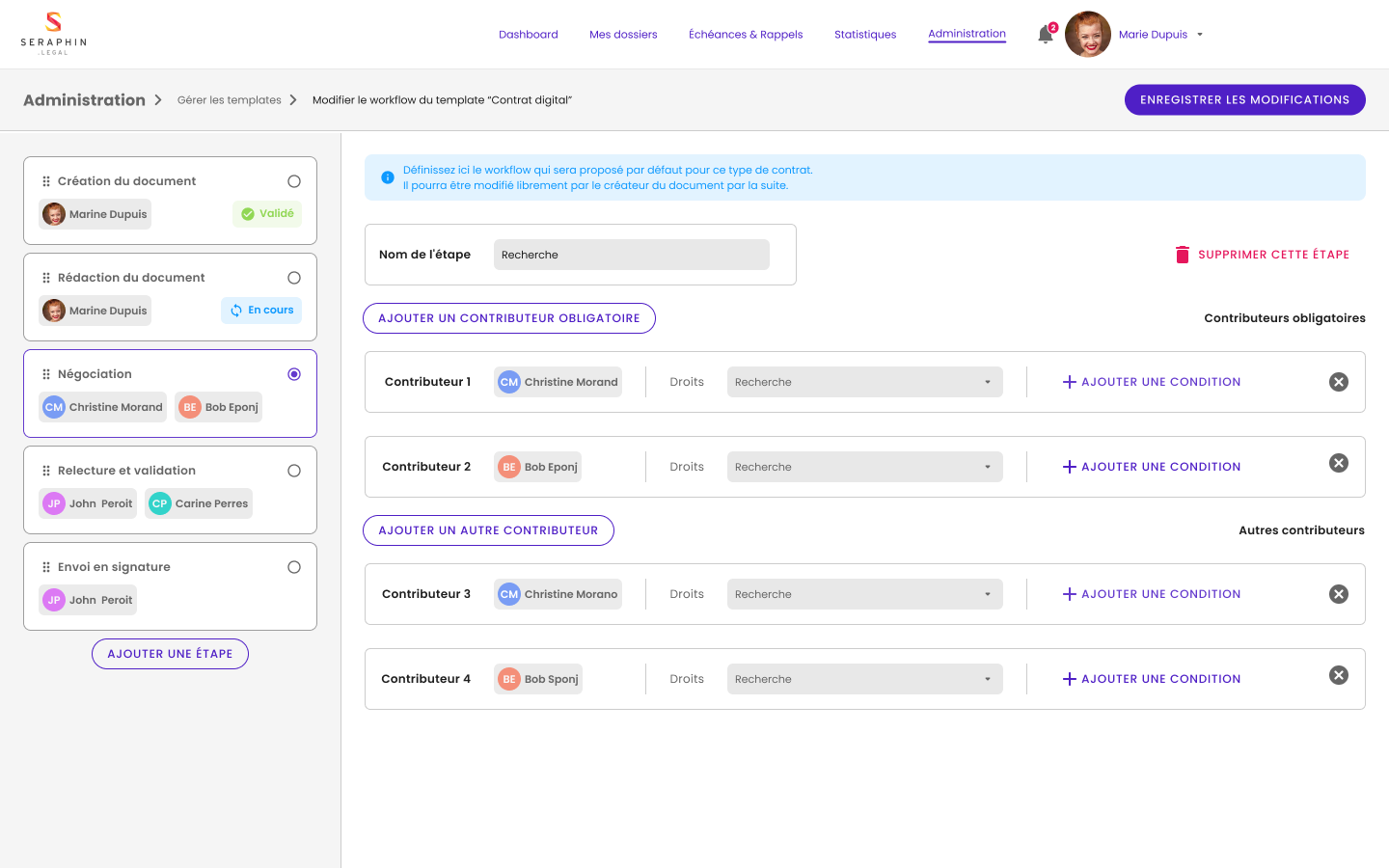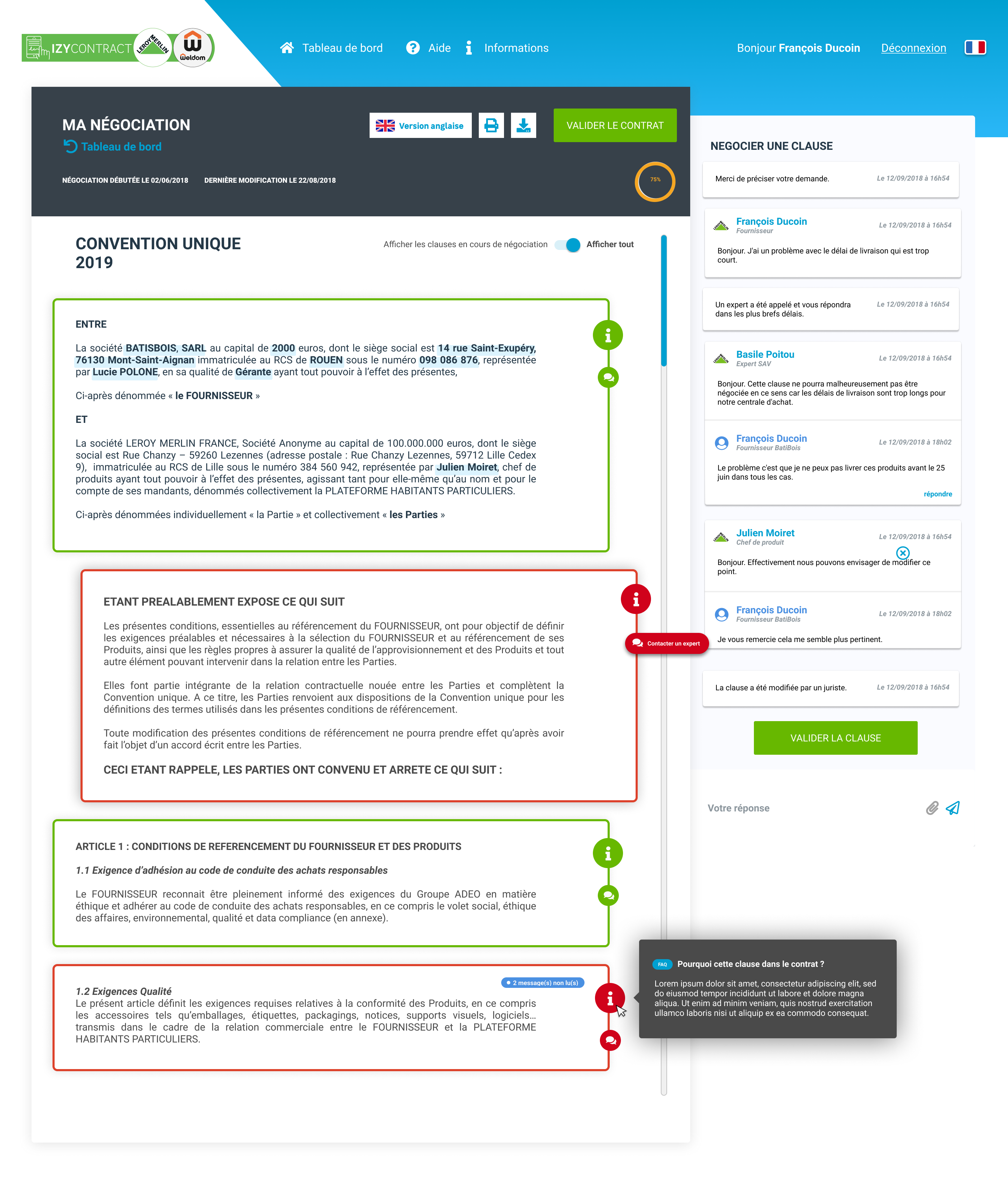What is a single distribution agreement?
The single distribution agreement is the result of the negotiation between a supplier and a distributor.
In order to avoid situations of imbalance, these relationships between professionals are subject to legal obligations set by the Commercial Code.
The single distribution agreement is valid for one calendar year and must be concluded :
✅ Either before 1 March of its year of application
✅ Or within two months of the start date of its marketing period
| 💡 Good to know: A document entitled "Terms of referral valid for the entire duration of the business relationship must be signed prior to the signing of the "Single agreement". The contracts may possibly be signed at the same time, but under no circumstances may the listing conditions be signed after the single agreement. |
This calendar constraint therefore implies the implementation of an optimised contractual process so that all the staff involved internally can conduct these negotiations under the best possible conditions throughout the campaign.
Who are the employees concerned internally?
Single distribution agreements involve different collaborators within your company:
👤 The legal teams, after-sales experts, Supply, Logistics and Quality: They are called upon throughout the negotiations by the product managers whenever a supplier asks a question or wishes to negotiate a given contractual clause.
👤 Product managers: They ensure the responsibility of purchasing on a panel of defined products. The product manager is therefore in charge of prospecting potential suppliers, negotiating prices according to the company's policy. His objective is to guarantee the best supply-product balance and to optimise his purchasing conditions.
Disadvantages of the traditional process
❌ Waste of time and time constraints: The product manager must systematically pass on suppliers' questions or remarks to the many parties involved in the negotiation at the distributor: lawyers, quality experts, logistics, after-sales service, finance, etc.
Exchanges with suppliers can be long, tedious and make negotiations more difficult. Product managers are very often responsible for providing a first level of response. This delays the conclusion of the agreement, even though distributors are legally obliged to sign these annual contracts before 1 March each year.
❌ Signature of the single agreement prior to the referencing conditions : Following our exchanges with many companies operating in the distribution sector, many of them have confided in us that it can happen that product managers do not respect the order of signature which constitutes a legal obligation.
❌ Negotiation by email and telephone: the work of modifying the contract during the negotiation is done by email, with the versions modified successively by the two parties being sent back. In the absence of collaborative work on a single document, the exchange of successive versions can lead to errors that are costly in terms of legal risk but also in terms of time.
❌ Legal risks: It may happen that the contract signed by does not correspond to the final version that had been validated by the distributor. As the entire contract can be modified by its users and the multiplicity of versions held by each can generate a legal and therefore financial risk for the company.
❌Costly signature: paper signature is a financial cost but also a time cost. A single agreement to be signed as quickly as possible before 1 March at the other end of France or Europe can take several days to arrive and exceed the legal deadline. The paper signature is all the more risky in view of postal hazards such as strikes, lost or damaged mail. This delays the conclusion of the agreement, the project and therefore the potential receipt of turnover.
❌ Lack of visibility on the contract: Who was involved in this contract? When? Who are the internal and external interlocutors? On what date was the contract validated and by whom? What is the main information to be retained from this single agreement? This is essential information for the company for employees who were not involved in the contract but who need to collect this information for a third-party project or to take over the contract following the departure of a product manager.
❌ Manual reporting: setting up a dashboard and proposing regular reporting on contractual activity can be a real nightmare when information is scattered, manual input and practices differ between product managers. Especially as departures and changes in position can also add to the difficulty of monitoring the negotiation with the supplier.
❌ Lack of communication between tools: Once the single agreement has been signed, either in paper or electronic form, the next step is to generate the invoice through dedicated tools that distributors are usually equipped with. Nevertheless, this action is not automatic and involves manual action at each new contract signature.
Benefits of an automated process
✅ Time saving : To avoid product managers receiving all the questions from co-contractors, some solutions like Seraphin.legal offer to connect the supplier with the right contact person on the distributor side directly from the contract management platform. The contracts to be negotiated are divided into blocks and backed up by an FAQ and a messaging system allowing the supplier to ask targeted questions on a specific block of the contract. When browsing the single agreement, suppliers have access to help bubbles next to each clause to answer their most frequent questions. As for messaging, each of the blocks is linked directly to the relevant contact person on the distributor side: an after-sales service expert for a clause on after-sales service, a lawyer for a legal clause, etc.
✅ Leveraging contract data: Beyond simply eliminating time-consuming tasks, automation also ensures data collection. All the data entered to complete a contract is used to enable you to monitor your contractual deadlines, create your contract sheets or even monitor the progress of the negotiation campaign and the performance of the teams through a statistical dashboard
✅ The single agreement cannot be signed before the referencing conditions :
Due to the setting of your contract workflow, it is possible to prevent an agreement from being signed only in the absence of referencing conditions. The result? Lawyers can simply check the chronology of signature of CR and CU in the tool and the risk of not respecting the order of signature of contractual documents CR and CU is technically prevented.
✅ Don't waste any more time signing: Once the contract has been validated by the supplier on the platform, the supplier automatically notifies the product manager who can start the signing process online. No risk of signing a previous version.
✅ Gain visibility on the contract: Who was involved in this contract? When did it happen? Who are the internal and external interlocutors? On what date was the contract validated and by whom? What is the main information to be retained from this confidentiality agreement? This is essential information for monitoring, taking over or auditing a contract, which you will find directly on the document's activity feed.
For a quick and easy understanding, each contract has a summary sheet automatically generated from the essential clauses of the contract (object, duration, amount, deadline, etc.). It is even possible to manually enrich the contract form by adding specific items to be displayed.
✅ Communication between your tools: Your contract management software is connected to the authentication system and business software through an API to keep all information up to date in real time (supplier information injected into different parts of the contract, including the header).
How to automate a single distribution agreement?
Create a single convention skeleton
In such an automation process, the legal team obviously retains control over the creation of the distribution agreement templates.
The aim here is to create the legal skeleton, the legally reliable vehicle that complies with the regulations and the company's strategy. It is therefore a standard version that will fit the single agreements most regularly signed by your product managers.
What questions should be asked before such a draft?
| Questions | Indications |
| What are the compulsory terms and conditions of a single distribution agreement? | This will give you a first rough and static version of your single convention. |
| What products should be purchased, are they covered by specific regulations? | This will allow you to prioritise the construction of your workbook according to priority needs. |
| What variables should be customised on the document? | This will enable you to construct your question form for the contract user. |
What are the most common questions your internal customers ask about confidentiality agreements?
| This will allow you to provide clarity by writing your questions or by using help bubbles to provide answers to suppliers on their 1st level questions. |
| Who are the relevant contacts for each clause? | This will allow you to connect the supplier to the right person when their question goes beyond the 1st level answers. |
Once you have created this standard contract in Word or Google Doc format, there are two ways to automate it:
- Via direct mail (via extensions such as Merge and Mailing)
- Via a no-code editor dedicated to the automation of contracts such as Seraphin Contract Management.
Your documented contracts will make your negotiation campaigns more fluid
Simplifying exchanges between distributors and suppliers is an essential prerequisite for making the negotiation phase more fluid.
On the one hand, product managers still spend too much time passing on suppliers' questions or remarks to the many stakeholders on the distributor's side.
On the other hand, suppliers are often dissatisfied with the response time of their contacts or the complexity of the information provided.
The documentation of clauses will make it possible to eliminate the first level of questions. Connecting the supplier to the appropriate contact person via a ticketing system will avoid the need to involve the product manager for each new question
Establish an internal approval system
Of all the steps in the contract lifecycle, the internal approval workflow is essential to ensure the compliance of your company's commitments and counterparties.
For a single agreement, the Legal Department will necessarily be appropriate to validate this type of draft contract. However, other parties such as the Purchasing Department or the Finance Department may want to systematically validate certain agreements according to certain types of criteria: everything depends on the company, its challenges, its strategy or its organisation.

| With a dedicated platform such as Seraphin.legal, you can determine the rules applicable to approve a document according to your criteria: type of contract, amount, field of activity, etc. |
Choose to combine contractual performance and legal certainty
No commitment, no credit card.




